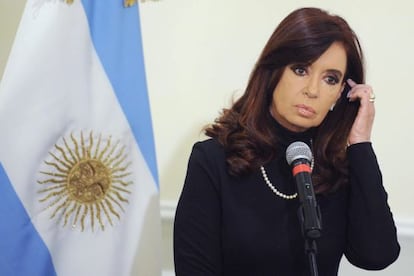Fernández presses ahead
Inflation, accusations of corruption and concerns over judicial reform are beleaguering a government deaf to criticism


That Néstor Kirchner and Cristina Fernández de Kirchner multiplied their fortune sevenfold during the former’s 2003-2007 tenure in the Casa Rosada presidential palace is a matter of record. In 2003 Argentina’s first couple declared 1.2 million euros in assets and five years later they were worth 8.5 million, spread out between various bank accounts and 23 properties.
But whether or not Kirchner diverted undeclared funds from Argentina to overseas accounts through his friend Lázaro Báez, a construction magnate, has never been proven. There were rumors and a lawsuit was filed in 2008 but no evidence of wrongdoing has been uncovered. On April 14, journalist Jorge Lanata revived the matter in a television interview with two people who linked Báez and Kirchner, who died in 2010, and the laundering of 55 million euros distributed among tax havens through 40 intermediary holding companies.
The program broke viewer records when it was broadcast but President Fernández remained silent. Leonardo Fariña and Federico Elaskar, the accountants who pointed the finger at Báez, retracted their accusation but that did not stop the constructor from filing a suit against them. Several opposition politicians have also asked the courts to look into the matter but as the days and weeks pass nothing has happened. On April 28, Lanata threw down the gauntlet on his television show: “I am in front of five million viewers saying that the president is concealing corruption. Please, tell us and prove to us that we are mistaken. If it is untrue, Cristina, tell it to the people.”
Fernández again kept her counsel. But on May 3 prosecutor Guillermo Marijuan, returning from a vacation, opened an investigation into Báez for suspected money-laundering. Marijuan criticized the work of those who had failed to look into a good deal of what was alleged and vowed to “discover to what end.”
Official figures place inflation at 10 percent. External estimates say it is closer to 23 percent
The case comes in the middle of a judicial reform that the government is pushing through without the support of most of the opposition and against the written recommendations of the UN Special Rapporteur on the Independence of Judges and Lawyers, Gabriela Knaul.
On April 30 Knaul called on the Argentinean administration to reconsider the two measures that have caused such furor among the opposition: the reform of the Magistrates Council, the country’s legal watchdog, and the introduction of a six-month time limit on court injunctions against the state in cases that don’t affect the welfare of citizens.
The bill proposes increasing the membership of the Magistrate’s Council from 13 to 19, with 12 of these being elected directly by popular vote. Knaul described this move as a “politicization” of justice without precedent anywhere in the world.
Foreign Minister Héctor Timerman issued a statement saying Knaul had an “incredible attitude” and accusing the UN representative of a “lack of impartiality, restraint and balance.” Knaul insisted in an interview with La Nación newspaper that the reform was a threat to democracy. She added she had asked the government to permit her involvement in an official capacity. “They didn’t respond with a yes or a no. I’m still waiting,” she remarked.
There are matters, such as the politicization of justice, that the Fernández government rejects outright and other that it attempts not to mention at all. Inflation, for example, has become a taboo subject. When Economy Minister Hernán Lorenzino was asked about inflation by a Greek reporter last month, he asked that the interview be terminated. “I would like to go now,” he said.
Official figures place inflation at 10 percent. External estimates say it is closer to 23 percent. Banks are offering 14-percent interest to customers who put their pesos in a current account. But there are many who trust more in the profitability and solidity of the dollar. Last June Fernández launched a campaign to “pesofy” the economy and even changed three million dollars of her own money into the national currency. But leading by example had little effect. The dollar then was worth 5.94 pesos and now it is closer to 10, leading it to be baptized the “Messi dollar.”
Inflation has the potential to erode Fernández’s government. So too does corruption. Fernández’s approval rating has fallen by 10 percentage points since Lanata’s program was aired. But the government’s stated aim is to keep unemployment figures down. There, its achievements are irrefutable. Despite growth having fallen by five percentage points since 2011, unemployment has remained steady at 7.3 percent, four times less than Spain (27 percent), the euro zone (12.2 percent) and only slightly higher than Brazil (5.7 percent) and Chile (6.2 percent). That is the primary reason that despite being embattled on all sides, Fernández’s approval rating remains at 50 percent.
Tu suscripción se está usando en otro dispositivo
¿Quieres añadir otro usuario a tu suscripción?
Si continúas leyendo en este dispositivo, no se podrá leer en el otro.
FlechaTu suscripción se está usando en otro dispositivo y solo puedes acceder a EL PAÍS desde un dispositivo a la vez.
Si quieres compartir tu cuenta, cambia tu suscripción a la modalidad Premium, así podrás añadir otro usuario. Cada uno accederá con su propia cuenta de email, lo que os permitirá personalizar vuestra experiencia en EL PAÍS.
¿Tienes una suscripción de empresa? Accede aquí para contratar más cuentas.
En el caso de no saber quién está usando tu cuenta, te recomendamos cambiar tu contraseña aquí.
Si decides continuar compartiendo tu cuenta, este mensaje se mostrará en tu dispositivo y en el de la otra persona que está usando tu cuenta de forma indefinida, afectando a tu experiencia de lectura. Puedes consultar aquí los términos y condiciones de la suscripción digital.








































